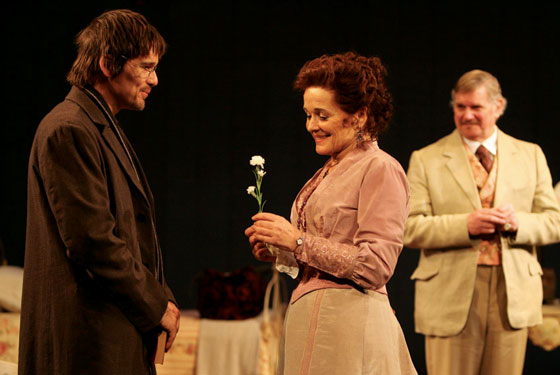
People spend a lot of time talking about money, asking for money, looking on the floor for money, and arguing about money in the intelligent, well-acted revival of The Cherry Orchard at BAM that kicks off the Bridge Project. “There was lots of money in here yesterday, and now there’s hardly any,” complains the spendthrift Liubov Andreeva Ranevskaya (Sinéad Cusack) as she digs in her purse. “I’ve always squandered money without a thought, like some madwoman.” An aristocrat fallen on hard times, Liuba has returned to her family’s estate after years abroad, the house mere months away from public auction. You can’t fault this production for its timeliness: Who are the Ranevskayas but a family that’s in over its head on the mortgage?
Director Sam Mendes has never been afraid of a showy flourish, onstage or off; take, for example, the Bridge Project itself, a cross-Atlantic experiment in classic repertory theater that intends to pack its productions with first-string actors and zing them merrily around the globe. In this Cherry Orchard, a sure-footed reworking by Tom Stoppard, the production’s big gestures are gorgeously realized but unnecessary. The onstage musicians; the magic tricks; an unexpected tableau vivant of bedraggled peasants—they’re memorable but misleading, getting in the way of the otherwise clear and compelling staging. (Worst of all is the masked-dance number that opens the production’s second half, an overliteral drama-school exercise that suggests an outtake from Eyes Wide Shut: The Musical.)
Mendes’s strength as a director (onstage and in films like Revolutionary Road) has always been about the remarkably detailed performances he draws from his actors. Even Chekhov’s throwaway moments—a pair of lost galoshes, or one squeaky shoe—are played here with great care by the show’s starry cast, including Britain’s Cusack, Rebecca Hall, and Simon Russell Beale; Canada’s Richard Easton; and America’s Ethan Hawke, who so effectively embodies the irritating lifelong student and progress-preaching Trofimov, I half expected someone to break with Stoppard’s language and call him a tool. But Beale steals the show. As the arriviste merchant Lopakhin, he makes the character’s open good cheer in the face of condescension from the penniless aristos a matter of the heart; in love with Liuba, he gives unexpected depth of feeling to his speech revealing who, after all, has bought the estate—a speech that curdles into rage as he knocks over every chair in the room.
The Cherry Orchard dramatizes the tension between venerating the past and rejecting it. Mendes, and Chekhov, don’t have a lot of sympathy for either viewpoint: Firs (the family’s aged servant, played by Easton) and Liuba, obsessed with bygone days, are stripped of everything they love; Lopakhin, angry at the slavery his family once endured, chops down the beautiful cherry trees and their “blaze of white blossom” to build summer cottages.
Chekhov’s final play famously ends with a sound effect; in Stoppard’s translation, it’s “the sound of a breaking string, dying away, sad.” The house on the river, the cherry trees, the servants, the upended chairs: they make a line in The Cherry Orchard, connecting the past to the future. By the time that sharp snap echoes through the BAM Harvey Theater, as this imperfect but engrossing revival reaches its moving conclusion, that line is severed forever.
The Cherry Orchard
By Anton Chekhov.
BAM Harvey Theater.
Through March 8.